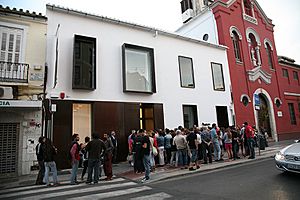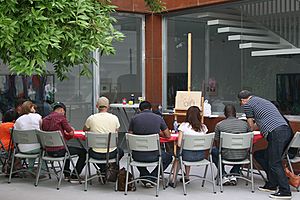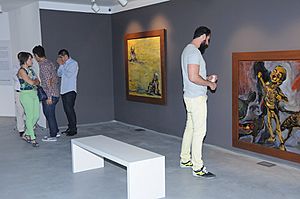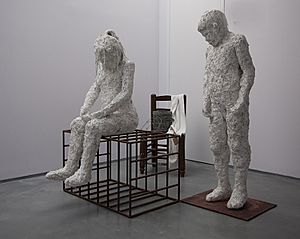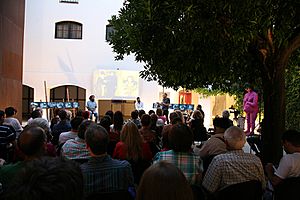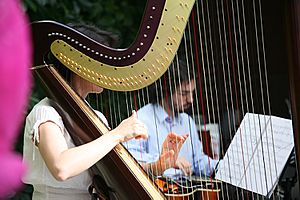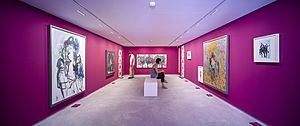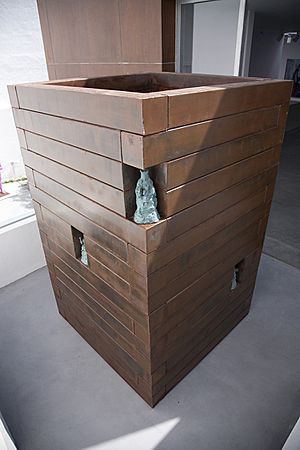Museum Jorge Rando facts for kids
Quick facts for kids Museum Jorge Rando |
|
|---|---|
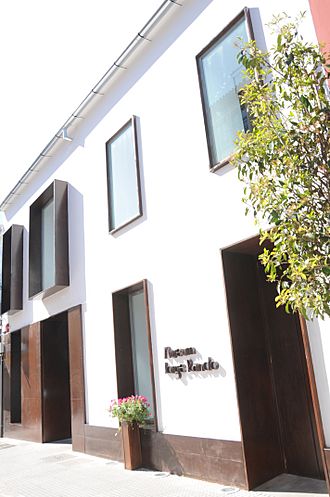 |
|
| General information | |
| Architectural style | Contemporary |
| Location | Málaga, Spain |
| Technical details | |
| Structural system | Structure-based portal of reinforced concrete |
| Design and construction | |
| Architect | D. José Antonio González Vargas |
The Museum Jorge Rando is the first museum in Málaga, Spain, dedicated to Expressionism. This art style started in the late 1800s. The museum is named after the painter Jorge Rando. It shows his paintings and also features art from other famous Expressionist artists from around the world. The museum opened its doors on May 28, 2015.
Contents
About the Museum
The main goal of the Museum Jorge Rando is to study and share the art of Jorge Rando. It also explores the ideas behind Expressionism. This art movement began in the late 19th century and is still important today. Expressionism has greatly influenced modern western culture.
The museum looks at different types of art, like painting, sculpture, architecture, and even philosophy, literature, movies, and music. It wants to show how these different art forms connect.
The museum reflects Jorge Rando's ideas and way of thinking. Its motto is: "Doors are always open… so that people can go inside and the museum goes outside." This means the museum welcomes everyone. It also shares art with the community. It looks at art from a spiritual and human perspective.
It is free to enter the museum. Guided tours are also free for everyone.
Art Exhibitions
Jorge Rando's Art
The museum rooms display Jorge Rando's own artworks. The art shown changes often. This allows the museum to feature different themes from his work. It also helps the museum show his art alongside pieces from guest artists.
Special Exhibitions
The museum also hosts special exhibitions. These shows feature artists from Spain and other countries. These artists are usually connected to Expressionism or Neo-expressionism. For example, in its first year, the museum showed drawings by Käthe Kollwitz. Later, it held the first major exhibition in Spain of sculptures by Ernst Barlach.
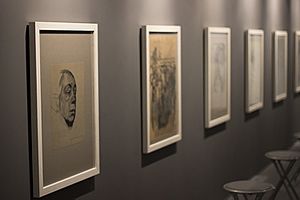
The Art Living Room
The Museum Jorge Rando is known as "La Sala de Estar del Arte," which means "The Living Room of Art." All year long, it hosts events for different art forms.
- The Color of Sound: This series is all about music.
- Lights and Shadows: This series features movie screenings and discussions. Each movie has an introduction and a debate afterward.
- The Cabinet: This series focuses on literature, theater, and storytelling.
- Art: This series includes discussions about art, reports, and meetings for artists.
- What's Happening: This series is for discussing current topics. It is organized with the UNESCO chair of Communication from Málaga University.
Visits and Learning
The museum offers guided tours. You do not need to book them in advance. You also do not need a certain number of people to join. These tours are led by Art Historians. They are not strict lectures. Instead, they are conversations where visitors can share their thoughts. This makes every visit a new discovery and a chance for everyone to learn.
The museum can also arrange special tours for groups with specific needs. There is a program to help students learn more about Expressionism, Neo-expressionism, and contemporary art. This program includes guided tours, art workshops, and discussion meetings.
The Building
The Museum Jorge Rando is located inside the Las Mercedarias monastery in Málaga. The building was designed by architect D. Manuel Rivera Valentín in 1878. It is considered an important and artistic building. In the back yard of the monastery, there is a large mandarin orange tree. It was planted over 140 years ago by the monastery's founder.
Work to turn part of the monastery into the museum began in 2011. The City Council of Málaga managed the project. It finished in the spring of 2014. Architect D. José Antonio González Vargas led the work. This historic and spiritual place is a perfect home for the powerful art of Expressionism.
Museum Spaces
The Museum Jorge Rando combines old and new designs. It mixes the historic courtyard with modern parts made of raw concrete and Weathering steel. This blend brings together the quiet, spiritual feel of the monastery with the strong energy of Expressionist art.
The museum has four exhibition rooms. They are all lit by natural light, which is a special feature of the building.
Other areas in the museum include a library, the inner yard, and a workshop. The workshop is a space where artists can create new Paintings. A group of artists often uses this space. It is a meeting point where artists, Historians, and visitors can talk about art and culture. This allows for a constant exchange of ideas and discussions.
Management
The Jorge Rando Foundation is in charge of running the museum. This includes managing all its activities. They organize exhibitions, art discussions, workshops, and seminars about Expressionism and its ideas.
See also
 In Spanish: Museum Jorge Rando para niños
In Spanish: Museum Jorge Rando para niños
 | Sharif Bey |
 | Hale Woodruff |
 | Richmond Barthé |
 | Purvis Young |


